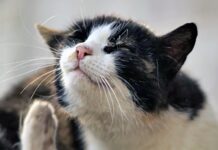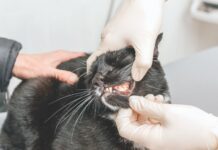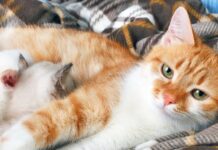Dear Elizabeth: My mother-in-law (ninety-one years old!) is coming to stay with us for a few weeks. Were busy picking up throw rugs and preparing a downstairs room for her to stay in to help avoid falls. My two cats, Napsack and Mel, know that somethings up and have been helping with the preparations – especially those that involve cardboard boxes! Our risk-avoidance plans for my mum-in-laws visit have me thinking about the boys. They are very polite, healthy, indoor cats with no behavioral or medical issues, but Im a bit worried about the possibility of their causing a health problem for my mother-in-law; are there diseases that we should worry about in this situation? Ive learned from my colleagues at the Feline Health Center that an ounce of prevention is worth a pound of cure, so I definitely approve of the thoughtful preparations youre making for your houseguest. Elderly people in particular may be at increased risk of animal-associated problems of two types: injury and infection. Anxious cats can react to stressful situations in unexpected ways, so it will be important to monitor Napsack and Mel closely when they are first introduced to your mom-in-law. Expect them to be curious about your guest, but be sure the cats seem their usual relaxed, happy selves as they get acquainted with her. Hopefully, the cats will take the presence of your mom-in-law in stride; your job will be to give them space and time to get used to the household change. Just in case there is a negative interaction, be sure to trim all 28 nails! As they get comfortable with your mom-in-law, Napsack and Mel may want to mark her as one of theirs. We all recognize and enjoy cats rubbing against our legs, marking us with their facial pheromones, but the behavior could knock your mom-in-law off balance and cause a fall. Risk of zoonotic infection (spread from animal to human) should be considered since your mum-in-laws age puts her in the group of people who are potentially immunocompromised. Luckily, Napsack and Mels lifestyle means they are at low risk for transmitting infectious agents. Their indoor status and lack of predatory behavior means they have little exposure to diseases and parasites. Even so, our advice is to minimize any possibility of disease transmission by following good hygiene practices. Ask you mum-in-law to avoid kissing the cats, to be careful about rough play or other interaction that might result in bites or scratches, and to wash hands thoroughly after any direct contact with the cats. According to the Centers for Disease Control (www.cdc.gov), cat owners should protect themselves from cat-related disease by taking these steps: Wash your hands thoroughly with soap and running water after touching cat feces (stool) Avoid cat scratches and bites If you are scratched or bitten by a cat, wash the area with soap and running water right away Vaccinate your cat against rabies. CDC advice for People at Extra Risk (which would include your potentially immunocompromised elderly relative) includes the following: Caring for Cats: If you have a cat try to have another person clean out litter on a regular (daily) basis. Do not place litter boxes in kitchens, dining rooms, or other areas where food is prepared and eaten. Keep your cat indoors. Avoid handling stray cats. Pet cats do not need to be tested for toxoplasmosis. Feeding Your Pet: Just like people, pets can get diseases from eating contaminated food. By protecting your pet from foodborne diseases, you can protect your own health as well. Pets should be fed only high-quality commercial pet foods. If eggs, poultry, or meat products are given to your pet as supplements, they should be well-cooked. Any dairy products given to your pets should be pasteurized. Additionally, pets should be prevented from drinking toilet bowl water and from having access to garbage. Do not let your pet scavenge for food, hunt, or eat other animals feces. I hope that this advice helps as you make arrangements for your mother-in-laws visit. My advice is to keep Mel and Napsacks schedules intact as much as possible (we cats do love our routines), and have fun! Love, Elizabeth



